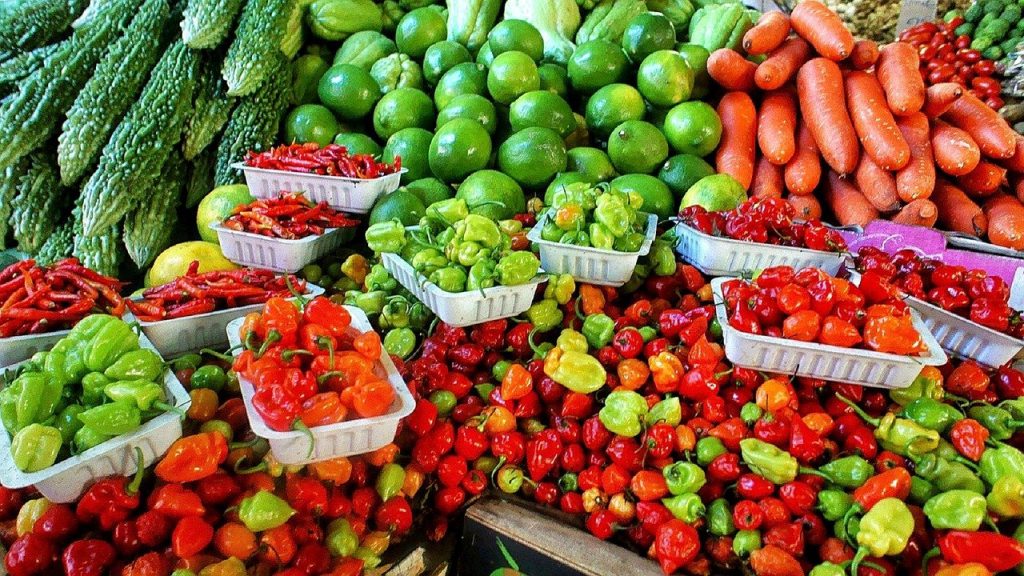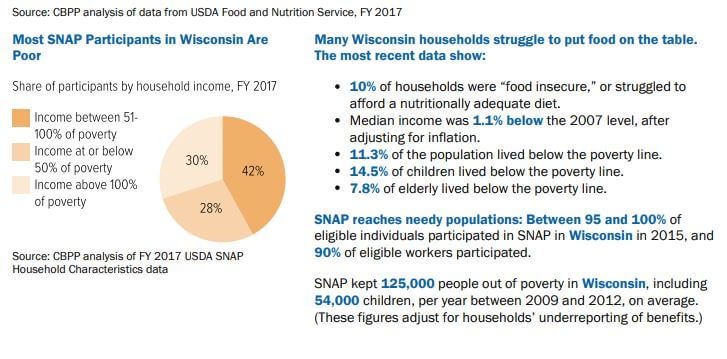Poor Hit Again by Food Aid Cuts
Trump follows Walker model to cut more, as many as 25,000 in state will lose aid.
On Wednesday, the Trump administration finalized a rule change that will make it more difficult for people to get food stamps — a change based around a model created by former Gov. Scott Walker and Wisconsin Republicans.
The changes, which will take effect next April, will reduce benefits people can receive food via the Supplemental Nutrition Assistance Program (SNAP). And while Walker’s cuts four years ago already hit food-stamp recipients hard, this rule stands to take the food benefits away from another 25,000- 27,000 people, according to estimates from the state Department of Human Services.
The 2015 state Republican cuts took food stamps away from roughly 100,000 Wisconsinites, adding work requirements and other hurdles to the program known also known here as FoodShare.
The Washington Post labeled that move an experiment that became “a Trump administration model.” Even after those cuts, in Wisconsin, one out of every 8 people still benefits from the SNAP program, a total of approximately 692,000 people.
Similar national changes were rejected last year by Congress after some Republicans tried to include the cuts in the 2018 Farm Bill.
That led to this week’s rule changes by the U.S. Department of Agriculture (USDA) that Democrats, including Wisconsin U.S. Sen. Tammy Baldwin, have labeled an attempt to bypass Congress. She joined 47 senators from both parties in sending a strong letter to USDA Sec. Sonny Purdue in March arguing against the cuts.
Baldwin notes her stance has not changed since that letter.
“Republicans and Democrats rejected this Trump administration proposal in the bipartisan Farm Bill due to the harmful effect it has on working people,” she says. “This is a heartless move that targets the part-time workforce, including seasonal employees and holiday workers while doing nothing to help them to actually become permanently employed.”
Reconsider “denying access to food”
While the USDA rules will be much more strict in permitting waivers, they do still allow states to waive the more stringent requirements during a severe economic downturn. But when Republicans in Wisconsin targeted SNAP reductions and restrictions — saying SNAP is ripe for fraud and abuse — they nixed waivers altogether.
Looking back, an interactive map from the Center on Budget and Policy Priorities (CBPP) shows Wisconsin had waivers that covered the entire state during the last recession, but reduced them over time before eliminating them entirely in 2015.
In 2016, Baldwin and Democratic House members Ron Kind (D-La Crosse), Gwen Moore (D-Milwaukee) and Mark Pocan (D-Black Earth) wrote to Gov. Walker demanding he “immediately restore” the waivers for 20 counties and 10 cities with high unemployment rates, saying poverty in Wisconsin had reached “alarming levels.”
Their request was ignored. And while the new, more stringent waiver rules will have a greater impact in some other states that had not already eliminated that provision of SNAP, there are two other pending regulations to restrict SNAP access. The combination of the changes could lead to 3.7 million fewer people receiving food stamp benefits nationwide.
The change will also affect schoolchildren: An Urban Institute analysis found that an estimated 982,000 students enrolled in SNAP who are automatically eligible for free- and reduced-price lunches at their schools will lose that eligibility.
Perdue called the regulation finalized this week an effort to “move more able-bodied” food stamp recipients “towards self-sufficiency” and into employment.
“We need to encourage people by giving them a helping hand but not allowing it to become an indefinitely giving hand,” Perdue said in a statement.
Déjà vu to Wisconsin 2015
Further indication that Wisconsin Republicans’ stance has not changed came from Congressman Glenn Grothman (R-Glenbeulah), who praised the tighter rules announced this week.
He noted another Wisconsin tie to these rules — a bill he introduced during the last Congress that would have reached his stated objective of having individuals “capable of working,” find “the dignity that comes with earning a packcheck.”
“I am glad to see that President Trump and his administration are taking the initiative on welfare reform,” said Grothman in a statement. “I am glad that we have a President who is putting the best interest of the country at the forefront.”
Grothman likened cuts to food aid to a form of patriotism from his viewpoint, because programs like SNAP, he believes, are a disincentive to work.
Not surprisingly, U.S. Rep. Gwen Moore (D-Milwaukee) had a response that was the polar opposite of Grothman when the rules were first announced.
“Poor people across the country are facing increased hardships and yet our President continues to make it harder for them to keep food on the table,” said Moore. “SNAP is a crucial social service safety net for more than 40 million people in the country who face severe hunger and malnourishment. It makes no sense to go after an anti-hunger food program that affects nearly 20 million children, almost 5 million low-income seniors, and 1.5 million veterans.”
“SNAP is the nation’s most effective anti-hunger program and critical to helping low-income families address the effects of poverty,” said Alexandra Cawthorne Gaines, vice president of the Poverty to Prosperity Program at the Center for American Progress. “Yet three times this year, the Trump administration has ruthlessly tried to take food off the tables of struggling families.”
Examiner’s Washington DC Bureau chief Robin Bravender contributed to this report.
Reprinted with permission of Wisconsin Examiner.























